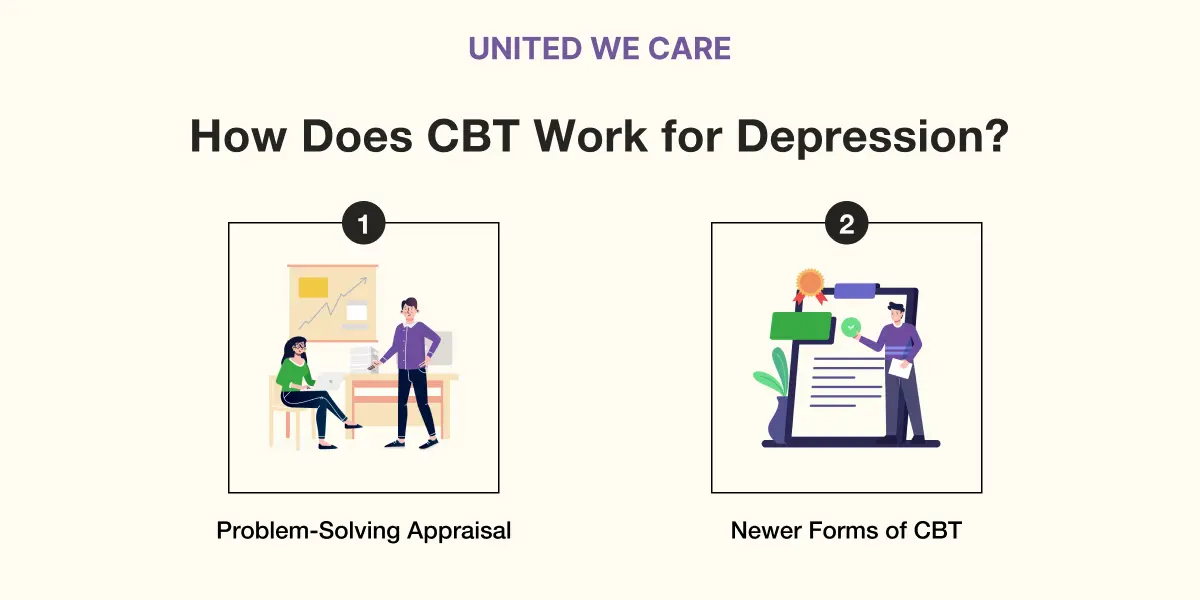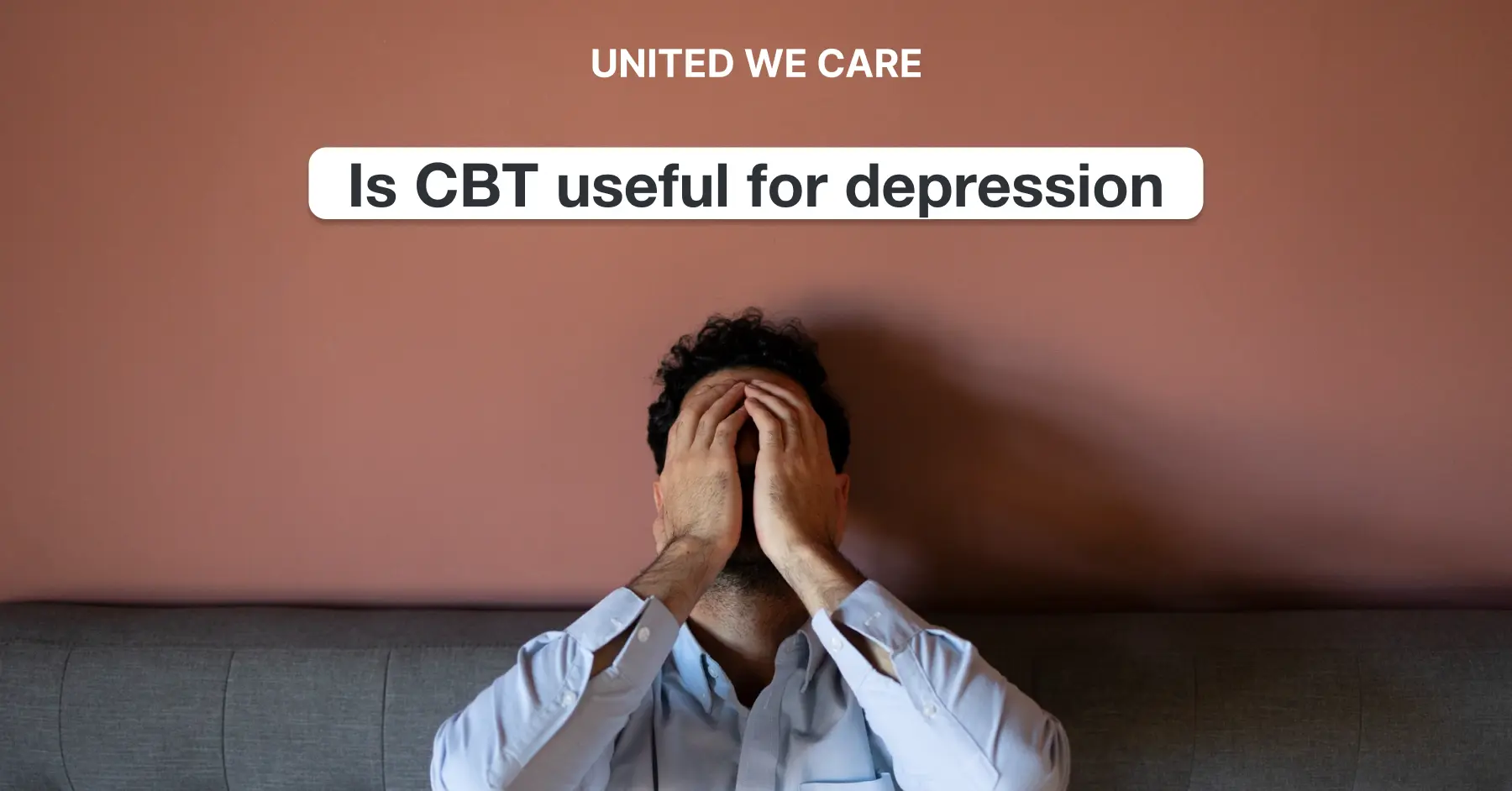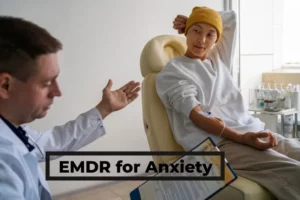Introduction
One cannot seek information about treatment for depression without coming across the term CBT. It is a highly prevalent choice for treatment and is preferred by a wide range of individuals diagnosed with depression.
In this article, we will take a closer look at why CBT is considered useful for depression. We will also discuss some useful CBT techniques and how CBT works, particularly in the case of depression.
CBT for Depression
CBT, which is short for Cognitive Behavioral Therapy, is a popular treatment for many mental illnesses, including depression. In fact, it is one of the most sought-after treatment modules for major depressive disorder.
This is partly because of how effective and beneficial CBT is for depression [1]. Additionally, CBT is also a common choice because of how logical, simplistic, and accessible it is [2]. Several people suffering from depression tend to find CBT not only doable but also sensible.
Useful Technique of CBT for Depression
In this section, we’ll take a look at some of the useful CBT techniques for depression. Bear in mind that these techniques, though helpful, work best when under the guidance of an expert.
CBT Triangles
This is a great place to start if you’re new to CBT. For this exercise, you need to draw a medium-sized triangle on a piece of paper. Label the three vertices as T for thought, F for feeling, and B for behavior.
Now, take a moment to reflect on what you’re going through. Can you identify a thought or label a feeling? If not, you can always start with the action you’re doing (or not doing) and backtrack from there.
The idea is to recognize each of these three interrelated aspects separately. We act a certain way because we feel a certain way. Moreover, how we feel and what we think affect each other. Doing CBT triangles helps you untangle your heavy feelings when depressed and, by doing so, figure out what’s making it worse.
ABC of CBT
Don’t let the lettering confuse you; this is a pretty simple concept. ABC stands for antecedent, behavior, and consequence. One of the guiding principles of CBT is to understand that every experience can be split into these three temporal events.
The antecedent is whatever happened just before the experience, and that’s why it can also be referred to as a “trigger.” The behavior is the action that one ends up doing when impacted by this antecedent.
Lastly, the behavior is followed by a consequence that often is negative when battling depression. Using CBT through ABC helps a person understand how certain behaviors lead to unfavorable consequences. It also shows you how one can choose to respond to a particular antecedent differently.
Cognitive Distortions
Another useful CBT technique for depression is to recognize cognitive distortions. A cognitive distortion, sometimes referred to as a “thought terrorist,” is an unhelpful way of thinking. It is called so because it is usually a mental bias that perpetuates our negativity.
While there are many, a few examples include black-and-white thinking, fortune-telling, and personalization. As the name suggests, black-and-white thinking is the cognitive distortion when you’re thinking in terms of binaries.
Fortune telling is when you start predicting all the negative things that could happen. Personalization, on the other hand, is the cognitive distortion of thinking that whatever is happening is related to you or caused by you.
How to Use CBT for Depression
One can use any or multiple of the techniques mentioned above to tackle depression using CBT. When you consult a CBT practitioner for therapy, you can also learn more such techniques. The following is how CBT can be used to reduce depression.
To Process Your Experience
As mentioned above, CBT helps you process your experience by breaking it down into aspects like thoughts, feelings, actions, antecedents, and consequences. When you make an effort to analyze all these factors, you can process a lot better.
To Identify Unhelpful Thinking
Since CBT is a type of treatment centered on how you think about something, it is really good for changing your perception. The idea is to identify what elements contribute to your negativity.
To Change Your Perception
Once you recognize these elements, all you have to do is replace them with more helpful ones. This takes practice, but over time, you find it easier to look for the silver lining.
To Practice Self-Care
By and by, you realize that the CBT practices actually go beyond the therapy sessions. You’ll need to start doing them out of your own volition and make time for such processing. Gradually, CBT becomes a part of your self-care routine as you need to sustain it to maintain your peace.
How Does CBT Work for Depression
The above sections have mentioned at great length how CBT is useful for depression. If you still have any doubts, let’s discuss how CBT works for depression. We’ll take a look at what the research says.

Problem-Solving Appraisal
One major way CBT helps with depression is to improve a person’s ability to solve problems. This occurs by improving a person’s problem-solving appraisal [3]. Basically, this is the ability to look at any circumstance with a solution-focused view instead of a problem-focused one.
Depressed individuals often struggle to find positives in a situation. However, with adequate practice in CBT, one can learn to overcome the negativity and concentrate on what to do next.
Newer Forms of CBT
CBT can also help depression because it is a widespread mental disorder, and this particular technique is quite accessible. It can be done by anyone, and over time, a person can do it independently without professional supervision.
Newer models of CBT, such as Group CBT [4] and Computerized CBT [5], reduce the amount of time taken for treatment as well. There is sufficient literature that backs the effectiveness of these forms of CBT.
How Many CBT Sessions Does It Take for Depression?
The total number of sessions required to use CBT for depression may vary from case to case. It also depends on the approach the mental health professional takes, whether they’re using only CBT or in addition to other modes of therapy.
Essentially, CBT would require around six to twenty sessions, and they are usually segmented into three phases. The initial phase is more centered around rapport establishment and psycho-education. The therapist guides your understanding of how CBT works.
In the middle phase, you start identifying your patterns of thought and recognizing which patterns are unhelpful. In the final phase, with practice and guidance, you learn to reappraise on your own and change your perspective.
Conclusion
Cognitive Behavioral Therapy is a highly effective therapeutic tool for individuals suffering from depression. Extensive research has been conducted to back these claims, and the literature continues to grow with modern nuances.
CBT for depression works by helping individuals identify their thought patterns. Then, by recognizing the unhelpful ways of thinking, one learns to change them with more helpful thoughts. Eventually, it becomes an established habit, helping one to think better and reduce depressive symptoms.
To learn more about CBT and depression or to reach out to our experts, visit the United We Care.
References
[1] Lepping, P., Whittington, R., Sambhi, R., Lane, S., Poole, R., Leucht, S., . . . Waheed, W. (2017). Clinical relevance of findings in trials of CBT for depression. European Psychiatry, 45, 207-211. doi:10.1016/j.eurpsy.2017.07.003
[2] J. A. López-López, S. R. Davies, D. M. Caldwell, R. Churchill, T. J. Peters, D. Tallon, S. Dawson, Q. Wu, J. Li, A. Taylor, G. Lewis, D. S. Kessler, N. Wiles, and N. J. Welton, “The process and delivery of CBT for depression in adults: a systematic review and network meta-analysis,” Psychological Medicine, vol. 49, no. 12, pp. 1937–1947, 2019.
[3] Chen, S.-Y., Jordan, C., & Thompson, S. (2006). The Effect of Cognitive Behavioral Therapy (CBT) on Depression: The Role of Problem-Solving Appraisal. Research on Social Work Practice, 16(5), 500-510. https://doi.org/10.1177/1049731506287302
[4] Moore, L.M., Carr, A. & Hartnett, D. Does Group CBT for Depression Do What It Says on the Tin? A Systemic Review and Meta-analysis of Group CBT for Depressed Adults (2000–2016). J Contemp Psychother 47, 141–152 (2017). https://doi.org/10.1007/s10879-016-9351-6
[5] Foroushani, P.S., Schneider, J. & Assareh, N. Meta-review of the effectiveness of computerized CBT in treating depression. BMC Psychiatry 11, 131 (2011). https://doi.org/10.1186/1471-244X-11-131










